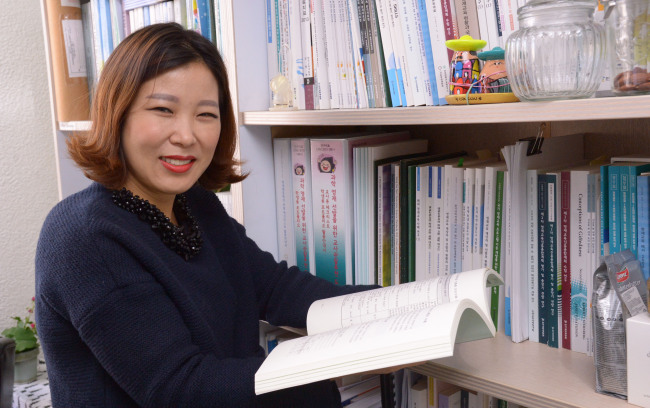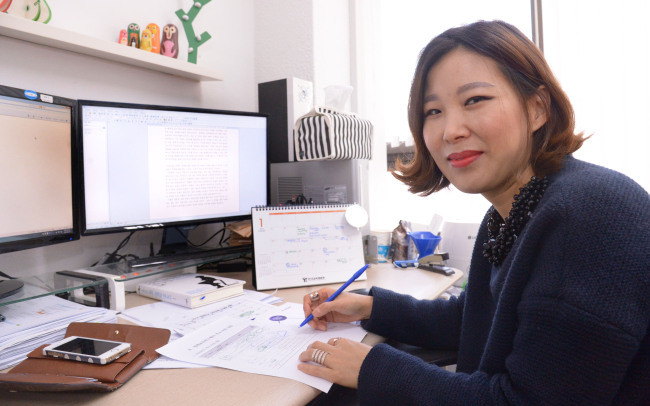The debate over gifted education in Korea has often played out between two sides: Opponents argue the special education program is tailored for the select few and undermines the principle of equal opportunity, while others see the programs as a chance to foster smart minds who can lead the nation.
A prominent expert in gifted education agrees with the latter. Suh Ye-won, director of the state-run National Research Center for Gifted and Talented Education says that the education can achieve a true sense of equal opportunity by helping talented students reach their full potential.
“Though the previous form of gifted education is only for those students who excel academically, the education now is about encouraging students with different talents to achieve their full potential. We are working to find those students and give them a chance to develop those talents,” Suh said in an interview with The Korea Herald.
“The purpose of gifted education is to give tailored education to different people. Giving the same education to students with different gifts is not an equal education. According to the Constitution Article 31 Clause 1, everyone is entitled to equal education according to their talent,” she said.
 |
Suh Ye-won, director of the state-run National Research Center for Gifted and Talented Education. Chung Hee-cho/ The Korea Herald |
The director noted that the government’s involvement is the unique part of the nation’s gifted education. In 2000, lawmakers enacted the Promotion Act for the Gifted and Talented Education, a law that paved way for the government to build schools and programs dedicated to gifted students.
Following the legislation, the government built comprehensive plans to implement the policy. In 2003, the Ministry of Education announced “the first Master Plan” to give the policymaker specified guideline on the gifted education. Since then, the plan has been updated every five year.
The recruiting process for gifted students is another distinctive feature, Suh added. She noted that Korea’s gifted education involved tailored tests and teachers’ recommendations, different from those of other countries that use a cognitive test to determine the students’ advanced ability.
“It is quite unique system. If gifted kids feel that they have a talent for certain area, they can design their academic trajectory following the area. We split the students into different categories and educate them accordingly,” said Suh.
“In fact, the government had wanted to abolish the paper test altogether and relied mostly on teachers recommendation in recruiting the gifted students. But some parents questioned the objectiveness of teachers’ recommendation. So the ministry decided to use both the test and recommendation,” she said
The education system for the gifted students is broken into three parts: Gifted Class, Gifted Education Center and Gifted School. “Gifted Class” and “Gifted Education Center” are similar to extra-curricular activities where talented students gather to receive advanced education outside of their curriculum.
Unlike the two, the Gifted School is a full-time high school. They only admits the student having passed the government assessment – such as paper test, interview, teachers’ recommendation and among others. In 2015, a total of 1966 students attend the school, an equivalent of 0.03 percent of total students.
 |
Suh Ye-won, director of the state-run National Research Center for Gifted and Talented Education. Chung Hee-cho/ The Korea Herald |
Critics blamed the gifted schools for creating the public fervor over private education. They asserted that the schools’ admission tests, which is too difficult for the students they say, compel parents and students to undergo immense cramming to get into the schools.
For instance, Education civic group “A World Without Worries About Private Education” claimed in December that over 66 percent of the gifted schools’ admission test in math includes questions that is above the standard of the middle school and outside of the regular curriculum.
Seo disputed the argument. “There is no mathematical evidence to supports the claim that gifted schools contributed to the soaring amount of private education. In Korea, private education is for college admission, not for gifted education. And Getting into the schools does not guarantee college admission,” said Suh.
“The gifted schools’ admission tests are too creative and complex. Private school and immense cramming do not make the student past the test. Even if some students made it through, they would fail halfway through the curriculum because it is too challenging curriculum,” she said.
The expert asserted that the nation should focus more on the gifted education’s positive aspect that the negative one. She noted that it is “absurd” to abandon the education altogether out of fear that it “might” cater to few free riders who could have received private education.
Among the benefits of the gifted education, she highlighted that it can discover marginalized talented students with little access to the advanced education. The government regulation mandates that the 10 percent of the gifted schools’ students must be filled with the underprivileged students. .
She hoped that the gifted education would be expanded to the area outside of math and science. Among the eight gifted schools, six are science schools and the other two’s admission is eyeing on science minds. According to the KEDI statistics, more than 80 percent of pupils are gifted students in science.
“There are many talented students with much potential who are deprived of opportunity for education. We need to find these kids and make them push to their full potential. In fact, some gifted schools’ teacher gather information about these kids and pay a visit to them to recruit,” she said.
“Personally, I believe that the system should evolve in a way that it can educate every student with diverse talent. These days, talents artists and athletes are as much as important genius scientists as singer Psy and figure skater Kim Yuna did,” she said.
By Yeo Jun-suk (
jasonyeo@heraldcorp.com)







![[Herald Interview] 'Trump will use tariffs as first line of defense for American manufacturing'](http://res.heraldm.com/phpwas/restmb_idxmake.php?idx=644&simg=/content/image/2024/11/26/20241126050017_0.jpg)
![[Exclusive] Hyundai Mobis eyes closer ties with BYD](http://res.heraldm.com/phpwas/restmb_idxmake.php?idx=644&simg=/content/image/2024/11/25/20241125050044_0.jpg)
